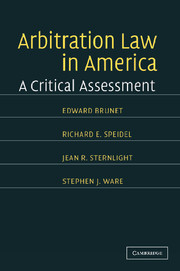Book contents
- Frontmatter
- Contents
- Acknowledgments
- Introduction
- 1 The Core Values of Arbitration
- 2 Common Legal Issues in American Arbitration Law
- 3 The Appropriate Role of State Law in the Federal Arbitration System: Choice and Preemption
- 4 Interstate Arbitration: Chapter 1 of the Federal Arbitration Act
- 5 Consumer Arbitration
- 6 International Commercial Arbitration: Implementing the New York Convention
- 7 Tension Points: Where the Authors Disagree
- Appendices
- A Ware's Revised Chapter 1 of the Federal Arbitration Act: 9 U.S.C. §§1–17
- B Speidel's Revised Chapter 2 of the Federal Arbitration Act
- C Sternlight's Proposed Amendments to the Consumer Arbitration Statute
- D Brunet's Federal Arbitration Act
- Index
A - Ware's Revised Chapter 1 of the Federal Arbitration Act: 9 U.S.C. §§1–17
Published online by Cambridge University Press: 16 November 2009
- Frontmatter
- Contents
- Acknowledgments
- Introduction
- 1 The Core Values of Arbitration
- 2 Common Legal Issues in American Arbitration Law
- 3 The Appropriate Role of State Law in the Federal Arbitration System: Choice and Preemption
- 4 Interstate Arbitration: Chapter 1 of the Federal Arbitration Act
- 5 Consumer Arbitration
- 6 International Commercial Arbitration: Implementing the New York Convention
- 7 Tension Points: Where the Authors Disagree
- Appendices
- A Ware's Revised Chapter 1 of the Federal Arbitration Act: 9 U.S.C. §§1–17
- B Speidel's Revised Chapter 2 of the Federal Arbitration Act
- C Sternlight's Proposed Amendments to the Consumer Arbitration Statute
- D Brunet's Federal Arbitration Act
- Index
Summary
GENERAL PROVISIONS
“MARITIME TRANSACTIONS,” “COMMERCE” AND “RECORD” DEFINED
“Maritime transactions,” as herein defined, means charter parties, bills of lading of water carriers, agreements relating to wharfage, supplies furnished vessels or repairs to vessels, collisions, or any other matters in foreign commerce which, if the subject of controversy, would be embraced within admiralty jurisdiction; “commerce,” as herein defined, means commerce among the several States or with foreign nations, or in any Territory of the United States or in the District of Columbia, or between any such Territory and another, or between any such Territory and any State or foreign nation, or between the District of Columbia and any State or Territory or foreign nation; “Record,” as herein defined, means information that is inscribed on a tangible medium or that is stored in an electronic or other medium and is retrievable in perceivable form.
VALIDITY, IRREVOCABILITY, AND ENFORCEMENT OF AGREEMENTS TO ARBITRATE
In any maritime transaction or a contract evidencing a transaction involving commerce, an agreement contained in a record to submit to arbitration any existing or subsequent controversy is valid, irrevocable, and enforceable, save upon such grounds as exist at law or in equity for the revocation of any contract. In the absence of such a ground, the arbitration agreement is enforceable by the remedy of specific performance.
STAY OF PROCEEDINGS WHERE ISSUE THEREIN REFERABLE TO ARBITRATION
If any suit or proceeding be brought in any of the courts of the United States upon any issue referable to arbitration under an agreement in writing for such arbitration, the court in which such suit is pending, upon being satisfied that the issue involved in such suit or proceeding is referable to arbitration under such an agreement, shall on application of one of the parties stay the trial of the action until such arbitration has been had in accordance with the terms of the agreement, providing the applicant for the stay is not in default in proceeding with such arbitration.
- Type
- Chapter
- Information
- Arbitration Law in AmericaA Critical Assessment, pp. 345 - 351Publisher: Cambridge University PressPrint publication year: 2006



